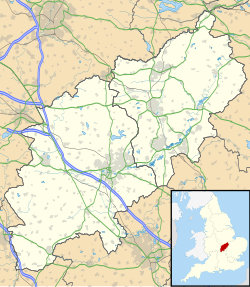Chacombe Priory
 House on the site of Chacombe Priory | |
| Monastery information | |
|---|---|
| Order | Augustinian |
| Established | 12th century |
| Disestablished | 1536 |
| People | |
| Founder(s) | Hugh de Chacombe |
| Architecture | |
| Heritage designation | Grade II* listed |
| Designated date | 11 September 1953 |
| Site | |
| Location | Chacombe, Northamptonshire, England |
| Coordinates | 52°05′28″N 1°17′18″W / 52.0911°N 1.2884°W |
| Grid reference | SP48854388 |
| Visible remains | core of building incorporated into country house; also chapel and medieval fishponds |
Chacombe Priory (or Chalcombe Priory) was a priory of Augustinian canons at Chacombe, Northamptonshire, England.[1]
Hugh of Chalcombe, lord of the manor of Chacombe, founded the priory in the reign of Henry II (1154–89).[1] on low-lying land just west of the village close to the stream.[2] Hugh gave the priory endowments including a yardland at South Newington.[3] In about 1225 the priory's property included eight tenements in Banbury, seven of which it retained until the Dissolution of the Monasteries in the 1530s.[4] By the time of the Hundred Rolls in 1279 the priory owned a tenement in Warwick, where it expanded its holdings until it owned a substantial number of tenements and cottages by the time of the Dissolution.[5]
On 27 September 1535 Sir John Tregonwell reported to Thomas Cromwell:
At Chacombe the prior is newly come, and is competently well learned in Holy Scripture. He is bringing into some order his canons, who are rude and unlearned. I am only afraid that he is too familiar and easy with them.[6]
When the priory was suppressed in 1536[1] its property included land at Boddington, Northamptonshire,[7] Rotherby, Leicestershire[8] and Wardington, Oxfordshire,[9] and a tenement at Thorpe Mandeville.[10] Today the only visible remains of the priory are a small chapel apparently built in the 13th century[11] and a set of mediaeval fishponds.[1] However, at least three medieval stone coffin slabs, including one from the 13th century, have been found in the priory grounds.[2]
Part of the priory site is now occupied by a house, also called Chacombe Priory. The house has a large Elizabethan porch and a late 17th-century staircase, and was remodelled in the Georgian era.[1][11] The house is a Grade II* listed building.[1]
Burials at the Priory
[edit]- Nicholas de Segrave, 1st Baron Segrave and his wife Maud
- John Segrave, 2nd Baron Segrave
- Stephen de Segrave, 3rd Baron Segrave (d. 1325)
References
[edit]- ^ a b c d e f Historic England (11 September 1953). "Chacombe Priory (1041228)". National Heritage List for England. Retrieved 10 November 2013.
- ^ a b RCHME 1982, pp. 26–27.
- ^ Baggs et al. 1983, pp. 143–159.
- ^ Colvin et al. 1972, pp. 42–49.
- ^ Stephens 1969, pp. 480–489.
- ^ Gairdner 1886, pp. 143–165.
- ^ Gairdner & Brodie 1898, pp. 315–331.
- ^ Gairdner & Brodie 1902, pp. 227–244.
- ^ Gairdner 1890, pp. 239–254.
- ^ Gairdner & Brodie 1901, pp. 272–287.
- ^ a b Pevsner & Cherry 1973, p. 146.
Sources
[edit]- Baggs, A. P.; Colvin, Christina; Colvin, H. M.; Cooper, Janet; Day, C. J. z; Selwyn, Nesta; Tomkinson, A. (1983). "South Newington". In Crossley, Alan (ed.). A History of the County of Oxford. Victoria County History. Vol. 11: Wootton Hundred (northern part). pp. 143–159.
- Colvin, Christina; Cooper, Janet; Cooper, N. H.; Harvey, P. D. A.; Hollings, Marjory; Hook, Judith; Jessup, Mary; Lobel, Mary D.; Mason, J. F. A.; Trinder; Turner, Hilary (1972). "Banbury – Manors and Other Estates". In Crossley, Alan (ed.). A History of the County of Oxford. Victoria County History. Vol. 10. pp. 42–49.
- Gairdner, James (1886). Letters and Papers, Foreign and Domestic, Henry VIII. Vol. 9 – August–December 1535. Institute of Historical Research. pp. 143–165.
- Gairdner, James (1890). Letters and Papers, Foreign and Domestic, Henry VIII. Vol. 12 Part 1 – February 1537. Institute of Historical Research. pp. 239–254.
- Gairdner, James; Brodie, R.H. (1898). Letters and Papers, Foreign and Domestic, Henry VIII. Vol. 16 – 1540–1541. Institute of Historical Research. pp. 315–331.
- Gairdner, James; Brodie, R.H. (1901). Letters and Papers, Foreign and Domestic, Henry VIII. Vol. 18 part 1 – January–July 1543. Institute of Historical Research. pp. 272–287.
- Gairdner, James; Brodie, R.H. (1902). Letters and Papers, Foreign and Domestic, Henry VIII. Vol. 18 part 2 – August–December 1543. Institute of Historical Research. pp. 227–244.
- Pevsner, Nikolaus; Cherry, Bridget (1973) [1961]. Northamptonshire. The Buildings of England. Harmondsworth: Penguin Books. p. 146. ISBN 0-14-071022-1.
- RCHME, ed. (1982). An Inventory of the Historical Monuments in the County of Northamptonshire. Vol. 4, Archaeological Sites in South-West Northamptonshire. London: Her Majesty's Stationery Office. pp. 26–27.
- Serjeantson, R.M.; Adkins, W.R.D., eds. (1906). "The Priory of Chalcombe". A History of the County of Northampton. Victoria County History. Vol. 2. Archibald Constable & Co. pp. 133–135.
- Stephens, W.B., ed. (1969). "The Borough of Warwick – Economic and Social History to 1545". A History of the County of Warwick. Victoria County History. Vol. 8: The City of Coventry and Borough of Warwick. pp. 480–489.


